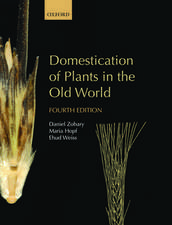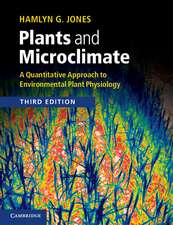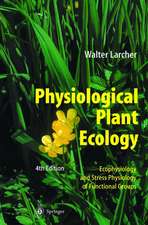The Pollen Tube: A Cellular and Molecular Perspective: Plant Cell Monographs, cartea 3
Editat de Rui Malhóen Limba Engleză Paperback – 2 ian 2013
| Toate formatele și edițiile | Preț | Express |
|---|---|---|
| Paperback (1) | 785.83 lei 38-44 zile | |
| Springer Berlin, Heidelberg – 2 ian 2013 | 785.83 lei 38-44 zile | |
| Hardback (1) | 949.73 lei 43-57 zile | |
| Springer Berlin, Heidelberg – 5 apr 2006 | 949.73 lei 43-57 zile |
Din seria Plant Cell Monographs
- 18%
 Preț: 947.04 lei
Preț: 947.04 lei - 24%
 Preț: 797.37 lei
Preț: 797.37 lei - 18%
 Preț: 957.62 lei
Preț: 957.62 lei - 18%
 Preț: 943.88 lei
Preț: 943.88 lei - 24%
 Preț: 790.00 lei
Preț: 790.00 lei - 18%
 Preț: 952.89 lei
Preț: 952.89 lei - 18%
 Preț: 948.16 lei
Preț: 948.16 lei - 18%
 Preț: 950.84 lei
Preț: 950.84 lei - 18%
 Preț: 1381.43 lei
Preț: 1381.43 lei - 18%
 Preț: 942.63 lei
Preț: 942.63 lei - 18%
 Preț: 1226.73 lei
Preț: 1226.73 lei - 18%
 Preț: 952.89 lei
Preț: 952.89 lei - 18%
 Preț: 943.43 lei
Preț: 943.43 lei - 18%
 Preț: 956.03 lei
Preț: 956.03 lei - 18%
 Preț: 1121.76 lei
Preț: 1121.76 lei - 18%
 Preț: 1386.48 lei
Preț: 1386.48 lei - 15%
 Preț: 634.00 lei
Preț: 634.00 lei - 18%
 Preț: 953.20 lei
Preț: 953.20 lei - 18%
 Preț: 952.09 lei
Preț: 952.09 lei - 18%
 Preț: 950.66 lei
Preț: 950.66 lei - 18%
 Preț: 945.30 lei
Preț: 945.30 lei - 18%
 Preț: 948.79 lei
Preț: 948.79 lei - 18%
 Preț: 1231.47 lei
Preț: 1231.47 lei
Preț: 785.83 lei
Preț vechi: 1033.99 lei
-24% Nou
Puncte Express: 1179
Preț estimativ în valută:
150.37€ • 157.39$ • 125.15£
150.37€ • 157.39$ • 125.15£
Carte tipărită la comandă
Livrare economică 26 martie-01 aprilie
Preluare comenzi: 021 569.72.76
Specificații
ISBN-13: 9783642068232
ISBN-10: 3642068235
Pagini: 308
Ilustrații: X, 295 p. 42 illus., 2 illus. in color.
Dimensiuni: 155 x 235 x 16 mm
Ediția:2006
Editura: Springer Berlin, Heidelberg
Colecția Springer
Seria Plant Cell Monographs
Locul publicării:Berlin, Heidelberg, Germany
ISBN-10: 3642068235
Pagini: 308
Ilustrații: X, 295 p. 42 illus., 2 illus. in color.
Dimensiuni: 155 x 235 x 16 mm
Ediția:2006
Editura: Springer Berlin, Heidelberg
Colecția Springer
Seria Plant Cell Monographs
Locul publicării:Berlin, Heidelberg, Germany
Public țintă
ResearchCuprins
The Pollen Tube: A Model System for Cell and Molecular Biology Studies.- Pollen Development, a Genetic and Transcriptomic View.- Ions and Pollen Tube Growth.- Genomic and Molecular Analyses of Transporters in the Male Gametophyte.- Small GTPases and Spatiotemporal Regulation of Pollen Tube Growth.- Lipid Metabolism, Compartmentalization and Signalling in the Regulation of Pollen Tube Growth.- The Actin Cytoskeleton in Pollen Tubes; Actin and Actin Binding Proteins.- The Microtubular Cytoskeleton in Pollen Tubes: Structure and Role in Organelle Trafficking.- The Architecture and Properties of the Pollen Tube Cell Wall.- Cellular Mechanisms for Pollen Tube Growth Inhibition in Gametophytic Self-incompatibility.- Extracellular Guidance Cues and Intracellular Signaling Pathways that Direct Pollen Tube Growth.-Screening and Analysis of Pollen Tube Mutations.- Comparative Analysis of Biological Models in the Study of Pollen Tube Growth.
Notă biografică
Rui Malhó is an associate professor in the Department of Plant Biology, Faculty of Sciences of Lisbon. He holds a Ph.D. in cell biology, with a major interest in signal transduction mechanisms and imaging of cell dynamics—in particular, the study of pollen tube growth and its signalling pathways. Dr. Malhó did post-doctoral work at the University of Edinburgh with A.J. Trewavas and has published 40 papers in international peer-reviewed journals and 8 book chapters.
Textul de pe ultima copertă
The enormous amount of data now available about the pollen tube clearly reflects its qualities as a biological model that go much beyond that of a carrier of sperm cells essential for plant reproduction. The diversity of techniques and methodologies currently used to study pollen and pollen tube growth is reflected in this book written by biochemists, cell biologists, molecular biologists and geneticists. Their different perspectives demonstrate that pollen tubes are excellent models for plant cell research, particularly suitable for investigations on cell tip growth and polarization, signal transduction, channel and ion flux activity, gene expression, cytoskeleton and wall structure, membrane dynamics and even cell–cell communication.
Caracteristici
Only up-to-date book on pollen and pollen tube Includes supplementary material: sn.pub/extras









